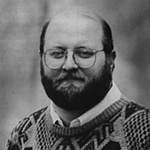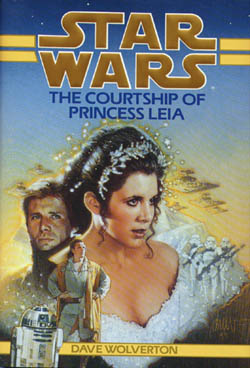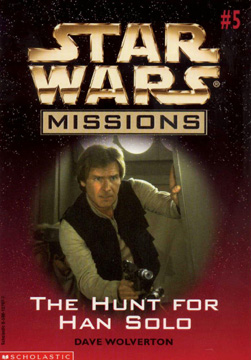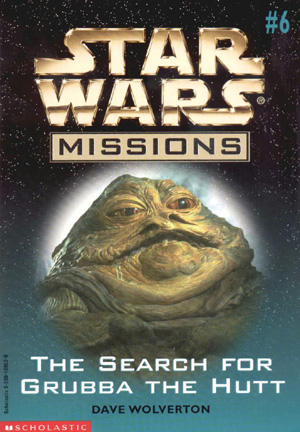Interviews -
Face To Face With The Masters
Any citizen of the galaxy may be summoned to answer to the Jedi Council. Here you may read the transcripts of such sessions.
Cellblock 1138 - 1997-1999 - 2000 - 2002 - 2003+

Dave Wolverton
October 1999, by Helen Keier
We were recently able to track down the ever elusive Dave Wolverton thanks to a tip by reader Taseldor. Dave Wolverton has written many Star Wars stories about some of the most significant events in the storyline. He wrote about the wedding of Han and Leia in The Courtship of Princess Leia, the first meeting of Obi-Wan and Qui-Gon Jinn in Jedi Apprentice: The Rising Force, and several stories in Tales of the Bounty Hunters, Tales from Jabba's Palace, and others. New TF.N Book correspondent Helen Keier had the pleasure of corresponding with Dave for this interview. On with the interrogation!

TF.N: In preparing for Jedi Apprentice #1: The Rising Force, did Lucasfilm give you the full story of Episode I in advance?
D.W.: I got to read Terry Brooks's novelization, and my editor at Scholastic had the screenplay. So if I had questions, I was free to ask him. The hardest part about working from the novelization was trying to figure out what characters looked like. Early on, I had no idea what a Dug looked like, or a Gungan, or Watto. At one point, Lucas said that in Star Wars, he was really making a "silent film" with just enough dialog tags to let you know what's happening. So for many of the characters, we learn most about them from nonverbal cues, from visual cues. Because of that, some fairly major characters really don't have a lot of lines, so you're left as a writer trying to imagine that character's personality. That's the real challenge.
TF.N: What guidance did Lucasfilm give you in writing Jedi Apprentice #1: The Rising Force? Was there anything you weren't allowed to do?
D.W.: Actually, I was allowed to do pretty much what I wanted. In Episode 1 you get a sense that Qui-Gon Jinn and Obi-Wan have a very close relationship. I wanted to create a tail that showed how that relationship developed, so I started out with Qui-Gon being very cold to Obi-Wan. My editors at Lucasfilm were afraid that the relationship was too cold, so we warmed it up.
TF.N: What did you change about the characters? The relationship?
D.W.: Not really very much. I cut a few sentences where Qui-Gon sort of wondered about how whether he'd ever be able to take on another apprentice, and I had Obi-Wan's training go a bit easier.
TF.N: What did you think of The Phantom Menace?
D.W.: I loved it. I've seen it three times now, and I was especially happy that my kids liked it so much. I think that in Phantom Menace, Lucas was really trying to create a family movie. He wanted to have relationship and action that a child could view, could understand and care about. And of course you don't want that to be as harsh as what we'd have for adults. So when I hear fans voice concerns, when I analyze the concerns they almost always come back to the issue of "This was written to a younger audience, and I wanted a more adult fantasy." Well, writers and directors have to make choices, and one of your first choices has to be targeting an audience.
The are are a number of things that really impressed me about the show. I loved the set and costume designs. I think that those really helped transport us to another world. But more impressive still was the use of CG characters. We're really moving close to the point where we can create anything in a movie. In particular, I thought that Sebulba worked great as a CG character. Some of the characters had cartoonish voices, and for me that tended to destroy the illusion that these were real beings. But in Sebulba's case that wasn't a problem.
TF.N: Which characters did you have a problem with?
D.W.: I hate to pick on the Gungans, but they bothered me.
TF.N: How much do you work with the editors and other Star Wars authors for projects like Jedi Apprentice #1: The Rising Force and Star Wars Missions from Scholastic?
D.W.: When I was writing things with Kevin Anderson (the Star Wars anthologies), and when I wrote Courtship, we worked pretty closely. With Jedi Apprentice #1, I wrote the first book and subsequent authors will build on it. With the Star Wars Missions pieces (which I think have been the most fun to write), I work in a four-book arc that hasn't had to correlate with what anyone else does. So I guess that my answer is that every piece is different.
TF.N: You've written a Star Wars novel geared toward adults (The Courtship of Princess Leia) and now with Jedi Apprentice #1: The Rising Force and your work for Scholastic, you're writing more for the younger crowd. Are these groups any diferent to write for? Is one easier than the other, or harder? In what ways? Do you have a preference, and why?

D.W.: Well, most of my non-Star Wars writing has been for an adult crowd, so I'm pretty used to writing at that level. Those books tend to be more complex as far as plotting goes, and your audience is a bit more critical. I've been writing some YA books of my own, and I really like writing to that group. You can handle just about anything as far as subject matter goes, and the books are a little tighter, more plot-driven. The work for the middle-grades is much more plot-driven, much faster paced, but your vocabulary is more limited, so that places some constraints on the work.
So, for me its easier to write young adult than either adult novels or middle-grade. However, when I look at which is most rewarding, which I'd rather do in the longrun, I tend to gravitate toward the middle-grade books. Kids at that age are such great fans. They send you illustrations from your work, and ask what color of hair you have, and want to know how to get started as a writer. That's really a lot of fun.
TF.N: Are your kids the age you write for? Do you seek their opinions of the books as you write them, or are they your biggest critics? Do you think being a parent impacts your writing? What do you feel kids (in general) take away from your stories?
D.W.: I have five children. The youngest is three and the oldest is thirteen. I don't ask their opinions on the books, though I'd be happy to listen if they offered. But being a parent certainly impacts my writing. Often when I'm writing a scene, I ask myself if I'd want my kid watching this at the movies--is it too gory, etc. Since I'm a Boy Scout leader, I also think I have a pretty good idea of what a nine- or ten-year-old boy finds funny, and that helps. As far as what the kids take away from the stories, I just hope that they're entertained. The work that I do with Scholastic is neat because the books have a little game that goes with them, so that the kids can "play" the action scenes from the book. I suspect that the game helps them with their reading, math, and problem-solving skills. That's a lot to take away from a book.





TF.N: (These two are an aside, but I was asked to put these questions to you, and they relate to Courtship. You can pass if you'd like.) Why was Luke's lightsaber blue in Courtship? Why did you decide to call Z-95 Headhunters "Zebra fighters", which are a completely different thing?
D.W.: (I'll pass on those ones. Writers are fallible.)
TF.N: Will you be doing any more Star Wars stories? What non-Star Wars stories are you working on?
D.W.: I'd be happy to do more Star Wars stories, though I don't think I have any on my slate right now. I just finished four Star Wars Adventures about two weeks ago. I really enjoy them. As far as non-Star Wars stories go, I write fantasy under the name David Farland, and I'm just finishing up the third book in the Runelords series, so I'm excited about that (you can access my web page at www.runelords.com). In addition to that, I have a couple of video game companies and a role-playing company that want to make games based on the runelords series, so I'll be working on that. In addition, I have a series called "The Young Olympians" (a new generation of Greek gods comes to earth to combat ancient enemies) that will be a Young Adult books series, a video game (from Saffire Corporation), and a comic book series. Beyond all of that, I've just started a little company that does screen writing, and I hope to be doing some motion pictures soon.
TF.N: How has your overall experience with Star Wars fans been? Positive? Negative?
D.W.: Almost all positive. I saw the first movie some 32 times when it came out (though I only watched the second one 17 times--maybe because I was poorer), so you have to remember that I'm a fan, too. In fact, I have these old pictures of me taken when I was 19, dressed up with an
Obi-Wan robe and a lightsaber. They looked pretty cool. I'd have a made a fine Jedi.
TF.N: How has working with the Star Wars Universe affected your career? Your writing?
D.W.: Hmmm . . . good questions. I'm not sure how much it affects my career. It did help me make a rough transition back during the recession of 92, when lots of SF writers were in deep trouble. But I think it has a deeper effect on my writing. I always liked the mixture of humor, adventure, world-building, and moral tone in SW. Working that universe helped me recognize that. I think that my own work is gaining a lot of readers because of some of those lessons.
(Special note: The next two questions were suggested by Helen's 11 year old son, Vince Skrapits.)
TF.N: What made you want to be a writer? Did you want to be a writer growing up? What do you like most about it? Least?
D.W.: I think that writers and artists are people who want to communicate, and they find that some art form allows them to express emotions and thoughts better than mere words alone. So, for me, a story is a form of communication. I think I always wanted to be an artist of some kind. If I wasn't drawing pictures or sculpting or making up stories, I was thinking about those things. The nice thing about being a writer is that people pay you for doing something that you love to do. The thing that I like least is that you never know when a paycheck will come.
TF.N: What inspires your stories? Where do most of your ideas come from?
D.W.: I'm not sure where ideas come from. I think that most of my stories are inspired by insights. I look at the world and notice something about how people act, or how the world works, and I want to use it in a story. But at the same time, that isn't all of the answer. I like to create worlds in my writing. I think that to some degree there is an impulse not only to capture my world, to communicate it, but to try to depict a better world.
TF.N: Any other comments? Perhaps something you'd like to add that we didn't ask about?
D.W.: I think this sounds fine. Thank you very much for inviting me! May the Force be with you--always!


